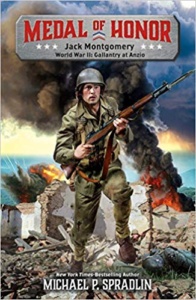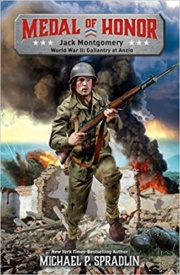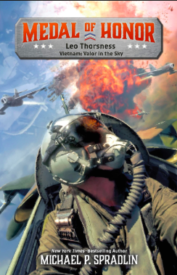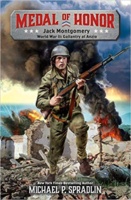Jack Montgomery: World War II: Gallantry at Anzio
Book 1 in the Medal of Honor Series
A book for Older Kids
Jack C. Montgomery was a Cherokee from Oklahoma, and a first lieutenant with the 45th Infantry Division Thunderbirds. On February 22, 1944, near Padiglione, Italy, Montgomery’s rifle platoon was under fire by three echelons of enemy forces when he single-handedly attacked all three positions, neutralizing the German machine-gunners and taking numerous prisoners in the process. Montgomery’s actions demoralized the enemy and saved the lives of many American soldiers.
Read an Excerpt
Extras
A Reading Guide for Medal of Honor: Jack Montgomery
 This 64-page download is a great resource! Chapter questions for readers to consider and discuss, vocabulary questions, crossword puzzles and activities that span the curriculum in addition to Reading: Writing, History, Social Studies.
This 64-page download is a great resource! Chapter questions for readers to consider and discuss, vocabulary questions, crossword puzzles and activities that span the curriculum in addition to Reading: Writing, History, Social Studies.
The Guide for Medal of Honor: Jack Montgomery was created by Janeen Kilgore, M.Ed.
Enjoy an Excerpt
↓ Jump to Ordering Options
Chapter 1. Stepping Ashore
Anzio, Italy
January 22, 1944
At least this time Lieutenant Jack Cleveland Montgomery would not have to lead his platoon through the icy cold, knee-deep seawater toward the beach. In Sicily, there were problems with the landings and men got wet. Still, every time he and his men came ashore, he thought about the way things worked in the U.S. Army—how the decisions of where and when to fight were made. The generals never asked the guys on the ground, the platoon leaders like him, for their opinions. They just gave the orders. He sure wished they’d asked this time. In private conversations, most every one of his fellow officers wondered about this battle plan. They said it made no sense. It was too rushed. They had air support and plenty of troops. But a lot was missing to ensure a successful mission.
First was the lack of critical intelligence. Which divisions of the German army were facing them? How many infantry? Artillery? Paratroopers?
German forces had been chased out of Sicily—the large Mediterranean island just off the “toe” of boot-shaped Italy—and were scrambling to get into position to hold the Italian peninsula. The Italians had already surrendered, their air force shot out of the sky. Did the Luftwaffe—the German air force—have pilots and planes in position? No one knew exactly what was ahead.
The Germans were concentrating their defenses along the Gustav Line, which stretched roughly a hundred miles across the narrowest part of the Italian peninsula. Thousands of soldiers manned machine guns and artillery in trenches and concrete fortifications across the mountains. Planted with land mines and strung with barbed wire, this defensive position blocked the most logical and direct route from the south to Rome, the capital of Italy.
The officers of the U.S. landing forces understood that Adolf Hitler, the German führer, was incensed at how quickly the Italian army had folded after the Allies showed up. If he didn’t divert German troops to slow the enemy’s advance north through Italy, the invaders could march right up to Berlin, the German capital, or invade southern France, which his forces occupied. Hitler already had his hands full with the Soviet army in the east, which was turning back his invasion of the Soviet Union. He was also fortifying the northern coast of France, believing the Allies would launch an invasion from across the English Channel. To say the Führer was in a bit of a tizzy would be a vast understatement.
Jack Montgomery had been with the Allied forces a few months earlier as they cut through Sicily like a sharp knife through cheese. He had earned a battlefield commission and was promoted from sergeant to second lieutenant. Now they had sailed around the Gustav Line, and Rome was within their reach. Still it wasn’t going to be easy. It never was. Lieutenant Montgomery and his men had no idea they would end up fighting some of the Nazis’ most battle-hardened troops.
The second problem, and the most critical for an infantryman as far as Lieutenant Montgomery was concerned, was that they were going ashore with almost thirty-six thousand troops but without nearly enough armor. His Thunderbirds—the 45th Infantry, with about fifteen hundred Native American soldiers—were landing behind the German lines. Only one division of armor was attached to the operation, providing limited tanks and heavy artillery for ground fire support. Not good. Not good at all. Without enough armor, infantrymen like Montgomery and his platoon didn’t tend to last long in a fight.
In truth, this was how the army worked. When leaders saw an opportunity, they took it. Sure, the generals studied maps, intelligence briefings, discussed the best way to deploy their forces, and made plans. But most of the time it was a “ready or not” approach. If they thought they had a chance to land behind enemy lines and punch Hitler in the kisser, they took it, whether or not they had the right number of troops, ships, equipment, or whatever. And they didn’t give two hoots and a holler about what a lieutenant in the infantry thought about their plans. Especially when the lieutenant was a Cherokee who belonged to a National Guard regiment. His opinions went to the back of the line. It was his job to fight when he was told to. The army wasn’t interested in his suggestions.“Dang, this water’s cold,” he heard a voice behind him say.
“It ain’t gonna get any warmer from all yer hot air,” a grizzled sergeant groused.
The soldiers of his platoon trudged through the water, in full gear, packs weighed down with ammunition and rations. Lieutenant Montgomery could tell his men were nervous and scared. Stumbling along, suffocated by equipment so heavy you could barely move, you could almost feel the German guns pointed at you.
That was another thing that bothered Montgomery. There weren’t enough landing craft. Instead, many troops rode in small boats as close to the shore as they could, and then waded the rest of the way. The whole operation felt rushed from the start. With a landing craft, you at least had a fighting chance. It could drive right up on the beach with its machine guns blazing, giving you covering fire. The ramp lowered, and you ran out of it like a fox chasing a hen until you found cover.
Sometimes the bullets flew so thick you swore you could walk on them. Then the tiniest piece of cover would do. A small dip in the sand, a piece of driftwood. Anything that made you feel like it would offer even the smallest amount of protection. The only thing he couldn’t understand was, here they were, wading ashore, and there was no resistance. No German or Italian machine guns or artillery attempting to halt their advance. At least not yet.
He didn’t like it. Not one bit. Had they somehow surprised the Germans? Were they expecting the Allies to land someplace else?
The platoon finally reached the shallows, and Montgomery and his team splashed ashore. The incessant German shelling had momentarily ceased. Montgomery and his men had been ordered in as reinforcements for an offensive taking place a few miles inland. So far, allied air power had been unable to knock out the German guns.
Montgomery studied the terrain around them. Far off in the distance he could see rocky mountain ranges. They were covered in thick woods. If he were the Germans, scrambling to get into position to defend against the invasion, that’s where he’d go. He wouldn’t like it, but he would concede the beach and concentrate his forces on the high ground. It was classic military strategy. Always take the high ground; facing an enemy from above gave you the advantage.
Montgomery looked back toward the beach. What days ago, had been empty shoreline, now teemed with tents, vehicles and army personnel. Further off, on the blue water of the Mediterranean Sea, dozens of Allied ships of all sizes bobbed on the waves. Compared to what they had gone through in Sicily, this landing had gone smoothly.
Too smoothly.
Hearing a low whistling sound, Montgomery returned his gaze to the distant mountains. It grew louder, heading straight for them. It was the unmistakable hum of an artillery shell. It was soon joined in chorus by dozens of others.
“Incoming!” someone shouted.
Montgomery’s platoon scrambled to grab their gear and take whatever cover they could find. The world around them exploded in noise and fire.
The Germans had just announced their presence with authority. Montgomery knew instantly this wasn’t going to be like Sicily. They wouldn’t be facing poorly trained and equipped Italian troops that had already given up.
“Everybody! Dig in!” he shouted. “I guess they know we’re here.”
end of excerpt
Jack Montgomery: World War II: Gallantry at Anzio
by Michael P. Spradlin
is available in the following formats:
Digital:
→ As an Amazon Associate I earn from qualifying purchases. I also may use affiliate links elsewhere in my site.










